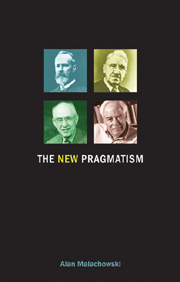Book contents
- Frontmatter
- Contents
- Preface
- Acknowledgements
- Abbreviations
- 1 Introducing the New Pragmatism
- 2 Leaving classic pragmatism behind
- 3 Rorty against the tradition
- 4 Putnam's contributions
- 5 Putnam and Rorty: pragmatism without reconciliation
- 6 Prospects
- Conclusion: the New Pragmatism and philosophy
- Notes
- Reading the New Pragmatists
- Bibliography
- Index
Preface
- Frontmatter
- Contents
- Preface
- Acknowledgements
- Abbreviations
- 1 Introducing the New Pragmatism
- 2 Leaving classic pragmatism behind
- 3 Rorty against the tradition
- 4 Putnam's contributions
- 5 Putnam and Rorty: pragmatism without reconciliation
- 6 Prospects
- Conclusion: the New Pragmatism and philosophy
- Notes
- Reading the New Pragmatists
- Bibliography
- Index
Summary
Strictly, ‘New Pragmatism’ is a descriptive phrase itching to become a name. I have given it capital letters to help it on its way. But, this does not mean that this book is oddly premature: professing to provide an introduction to a currently non-existent movement. There is plenty for a fledgling name to latch on to.
The great American pragmatist revivalist Richard Rorty used the phrase ‘New Pragmatism’ occasionally, and in descriptive senses that matched our own purposes (e.g. 2000a: 95). He wanted to stake out a philosophical position that derives from the original pragmatism of William James and John Dewey, but differs in two main aspects. First, it avoids talking about experience, along with empiricist notions in general, by talking about language instead. And secondly, it abandons the idea that there is such an epistemically sweet thing as scientific method, something that should serve as a model for all enquiry, because whoever practises it maximizes their likelihood of attaining true beliefs.
Cheryl Misak (2007) recently relied on ‘New Pragmatists’ as the title of a very worthwhile anthology of writings by thinkers who, despite her own anti-Rortyan predilections, mostly fit in with our broader aims. They are linked to the pragmatism of Charles Sanders Peirce, William James and John Dewey in various ways, and with varying degrees of tightness. Moreover, their approach to philosophy manifests three fairly straightforward pragmatist commitments: (i) objectivity is “historically situated”, and none the worse for that, (ii) “knowledge has no foundations”, and (iii) philosophy needs to keep “connected to first order inquiry, to real examples, to real life experience” (ibid.: 6–7).
- Type
- Chapter
- Information
- The New Pragmatism , pp. ix - xiiPublisher: Acumen PublishingPrint publication year: 2009

